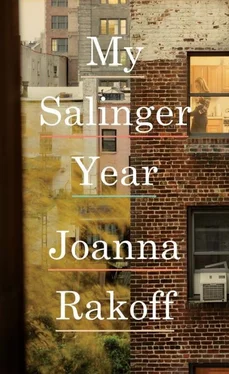The next night, still feeling the effects of that martini—and the one that had come after—I forced myself to stay home. From the gray couch, piled under blankets, I called Jenny, who was bogged down in wedding preparations. The boathouse: nixed once and for all. A former dance hall in midtown, with its red candy-box interior: booked for a date two Julys hence, the first available opening, a full three and a half years after Brett’s storybook proposal. “Maybe you should just elope,” I told her, the phone growing warmer from proximity to my ear. The wind blew fiercely, stray leaves flying in gusts against the window like moths. I wore a woolen bathrobe over which I’d fashioned a shawl out of an old afghan. Tonight, Don was out running—running in the cold, the dark, which sounded utterly unpleasant to me—in another effort to get his weight down for a fight. He had to fight as a flyweight, otherwise, he’d be pummeled. His novel had now amassed half a dozen rejections, which he had pinned to the fridge with magnets; they winked at me from the corner of my eye, the familiar logos of various publishers, the blocks of black text.
“I think Brett’s parents would die if we did that,” she said.
“Hmm,” I said, annoyance welling up. I tried to tamp it down, unsuccessfully. “But you want a big wedding,” I blurted. “Right?” Why did I need to call her out on this? Why couldn’t I just pretend that the Big Event was for Brett’s conservative parents?
“I do,” she admitted warily. “I think there’s value in taking vows in front of all your family and friends. And celebrating with them, too.” She took a sip of something. Very likely something sweet. She and Brett drank like middle schoolers: Malibu and Coke. Fuzzy navels. As if they were purposefully trying to appear unsophisticated, to mock the pretensions of the creative class, our craft beers and local wines. In Staten Island, they’d kept the bottle of Malibu right on their kitchen counter. “A wedding is kind of an excuse to have a big party.”
“And to buy an amazing dress?” I suggested, willing cheer into my voice. I wanted—I did—to get in the spirit of things. But I still didn’t understand why all this was so important to her. Why did she need to bankrupt her parents? Why was she devoting so much time and energy to what, as she herself said, amounted to a big party? And then, all of a sudden—like a curtain drawing away—it all became clear to me. I heard her words as something more than platitudes: to take your vows in front of friends and family . And my heart melted. She needed this wedding—this perfect, minutely orchestrated wedding—to shout, This is who I am . To tell us all that she was not that girl who’d tried to kill herself freshman year, the girl who developed an unhealthy obsession with her poetry professor junior year, the girl who had baffled psychiatrists and mystified her parents, for she had once been so perfect, so good, so obedient.
Just as Franny Glass had once been, before she collapsed in a Princeton restaurant and installed herself on her parents’ couch.
Just as I had once been.
It had taken a few more years for my house of cards to collapse. Or, well, for me to knock it down. With Don. Don: my implement of destruction. Jenny had dated her share of Don-like guys. In fact, she’d been involved with one—obsessively, all consumingly so—when she met Brett. In fact, Brett was the guy’s roommate. The wedding would whitewash that mess, too, I supposed. But: No wonder Jenny hated Don. No wonder my life frightened and disturbed and repelled her.
In a few years, would I be marrying a law student who exclusively read histories of the Great War? I tried to imagine devoting the time and energy that Jenny had put into her wedding. Or, more important, choosing a partner, for life , who didn’t share my interests, my own particular view of the world. I could picture none of it. For a moment, I allowed my mind to turn to my college boyfriend, whom I had not been brave enough to call, who was surely in his Berkeley apartment, jotting notes on manuscript paper or reading Lermontov, and my breath caught with longing. In a year, would I be there with him, walking along Telegraph with his arms wrapped around me? If not there, then where? And then, suddenly, I knew. Not here. I would not be in this apartment, with its missing sink. I would not be typing letters for my boss. And I would not, most definitely would not, be waiting for Don to return from a run.
“It’s going to be great,” I told Jenny. “It’s going to be perfect.” And again, I wasn’t lying.
• • •
One morning, as I pored over yet another contract, I heard my boss cry, “Darn it!” A moment later, she came sauntering over to my desk. “What are your plans for lunch?” she asked.
“I’m not sure,” I said nervously. Was she going to ask me to have lunch with her? This seemed highly improbable.
“Do you think you could drop something off at The New Yorker for me?” I sat up a little straighter at the mention of The New Yorker . “Izzy is out again.” Izzy was the Agency’s wizened, cheroot-smoking messenger, who communicated purely through grunt and hand gesture and whose deep, chesty cough kept him home three days out of five. “I tried the messenger service, but they won’t have anyone until the end of the day, and then I realized, well, the Condé Nast building is just across the street really. Why not just walk it over?”
“Of course,” I said, my heart now thunking crazily in my chest. The New Yorker . I was going to the offices of The New Yorker . Should I call the auburn-haired editor and let him know I was stopping by? Or the fiction editor’s assistant? No, I thought, I wouldn’t be giving them enough notice. I would be putting them in an awkward position, having to tell me, “Sorry, I’m swamped today.” But a Brown Derby sort of scenario occurred to me: I would drop off the package with a kind, interested editor who would engage me in conversation about the author or the Agency—surely he would know the Agency—or Salinger. Or, I’d run into the auburn-haired editor and he’d say, “Hey, let me introduce you to my boss!” And maybe one of them would say, “Well, if you ever want to leave the Agency, just give me a call.”
An hour later, I dashed out—without even putting on my coat—a brown paper package under my arm. On Madison, the sun shone in jagged beams and the air held the promise, the hint, of warmth, but it was still cold, icy gusts blowing up my sleeves, and I quickened my pace as I crossed the avenue to the gray building, which housed all the magazines owned by Condé Nast. I’d imagined The New Yorker operating out of a brownstone on some genteel, tree-lined block, the editors gathering at four for tea in the parlor. I had imagined it, I supposed, as an operation akin to the Agency.
But the Condé Nast building was just a dully anonymous office tower, like all the buildings on Madison and Park and Lex. I walked quickly through the sleek gray lobby and boarded the appropriate elevator, trying not to smile to myself —The New Yorker !—when the doors closed with a thunderous ding. On my designated floor, I found a reception desk with The New Yorker ’s distinctive logo discreetly hung above it and handed over my package to the older lady—her face sweetly powdered—at its helm. I glanced around, thinking perhaps I’d see one of the editors from the party, passing through on his way to lunch. But the area was empty. “This is from my boss,” I told her. “At the Agency.”
“Of course,” said the receptionist, smiling kindly. She had the rheumy voice of a longtime smoker and wore her hair pulled back in a bun. “I’ll have it delivered right away.”
Читать дальше












